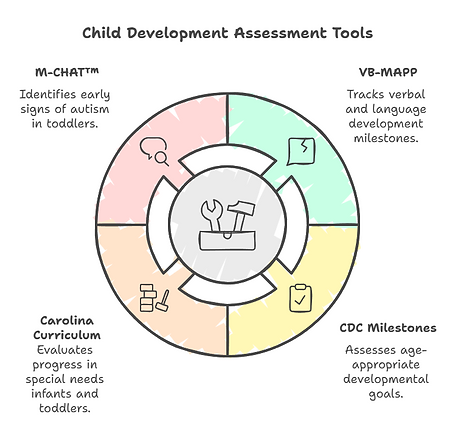
Some Comorbidities of ASD
-
Attention Deficit Hyperactivity Disorder (ADHD)
-
Anxiety Disorders
-
Intellectual Disabilities
-
Epilepsy or Seizure Disorders
-
Sleep Disorders
-
Sensory Processing Disorder
-
Depressive Disorders
-
Oppositional Defiant Disorder (ODD)
-
Gastrointestinal Issues (e.g., constipation, diarrhea)
-
Motor Coordination Difficulties (e.g., dyspraxia)
Supporting Research
-
A study by Lai et al. (2014) found that ADHD, anxiety, and sleep disturbances are particularly common in individuals with ASD, affecting their daily functioning and treatment outcomes.
-
Matson & Nebel-Schwalm (2007) highlighted that intellectual disabilities and epilepsy are often seen alongside autism, complicating diagnosis and treatment. They reported that about 30-50% of children with autism also have intellectual disability.
-
Zablotsky et al. (2013) emphasized the frequency of gastrointestinal issues, noting that around 30-70% of children with ASD experience gastrointestinal symptoms, which can be distressing and impact quality of life.
-
A review by Leekam et al. (2011) found that sensory processing issues are frequently observed in children with autism, affecting their ability to interact with their environment effectively.
-
McDougle et al. (1996) found a significant correlation between depression and autism, particularly in adolescence, highlighting the importance of addressing mental health alongside other ASD interventions.
Some Early Symptoms
.png)
Chat with us today for a quick M-CHAT™ screening. This tool helps identify autism risks. A positive result simply indicates potential risks, not a diagnosis.

To diagnose or not to diagnose? That is the question...
In the Singapore context, a diagnosis is crucial if the goal is to place your child in specialized schools such as Pathlight School, St. Andrew's Mission School, or the various APSN schools. These institutions offer a better teacher-to-student ratio and are specifically equipped to support your child’s ongoing development.
However, for early intervention, it’s important to note that programs like EIPIC or private interventions do not necessarily require a formal diagnosis. Many developmental pediatricians/clinical psychologist may also be hesitant to provide a diagnosis at an early age and often use terms like “ASD-like” or “Suspected ASD” instead.
At Learning to Learn Singapore, our approach is simple—focus on early intervention to achieve the best possible outcome. If a child progresses sufficiently to attend a mainstream school with minimal support, then that’s wonderful, and a formal diagnosis may not be necessary. However, if a child requires a slower pace and a high-support environment to excel, seeking a diagnosis closer to schooling age is a fair approach, as the child will have developed more skills by then.
It’s also important to note that if our behavior consultant suspects that there could be other developmental challenges, especially since ASD often comes with comorbidities, we will discuss these concerns in-depth with parents. In such cases, seeking a further diagnosis to gain clarity on the child's condition may be beneficial for the child’s development and allow for the appropriate interventions.
At Learning to Learn Singapore, we reference a number of screening tools to help in our assessment of each child's development. Below are some of the key tools we referenced:
-
VB-MAPP (Verbal Behavior Milestones Assessment and Placement Program) - Developed based on milestones, the VB-MAPP tracks a child's verbal behavior and language development, providing a clear picture of their communication abilities and needs.
-
CDC's Developmental Milestones - The Centers for Disease Control and Prevention (CDC) provides a comprehensive list of typical developmental milestones that help us assess whether a child is meeting age-appropriate developmental goals.
-
Carolina Curriculum for Infants and Toddlers with Special Needs - This tool is designed to assess the developmental progress of infants and toddlers with special needs, offering a thorough evaluation of cognitive, motor, communication, and social skills.
-
M-CHAT™ (Modified Checklist for Autism in Toddlers) - This screening tool is designed to identify early signs of autism in children, providing a quick and effective way to assess the potential risk of autism.
.png)

As parents, you know your child better than anyone else. If you ever feel something is not quite right with your child’s development, trust your instincts. Early identification and intervention can make a world of difference. If you have concerns about your child's speech, behavior, or overall development, don't hesitate to seek professional help.

